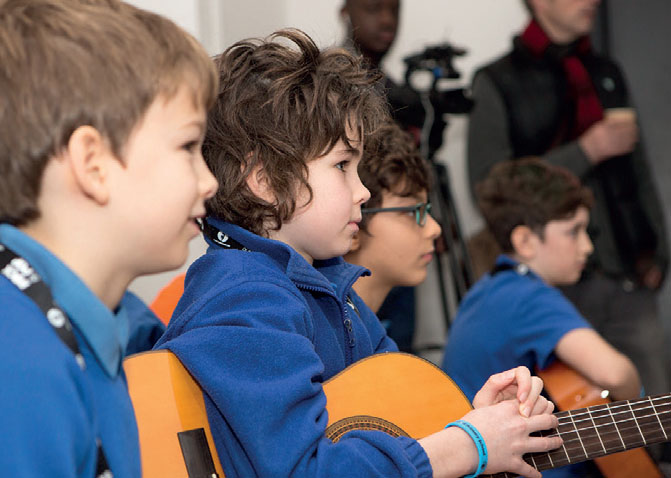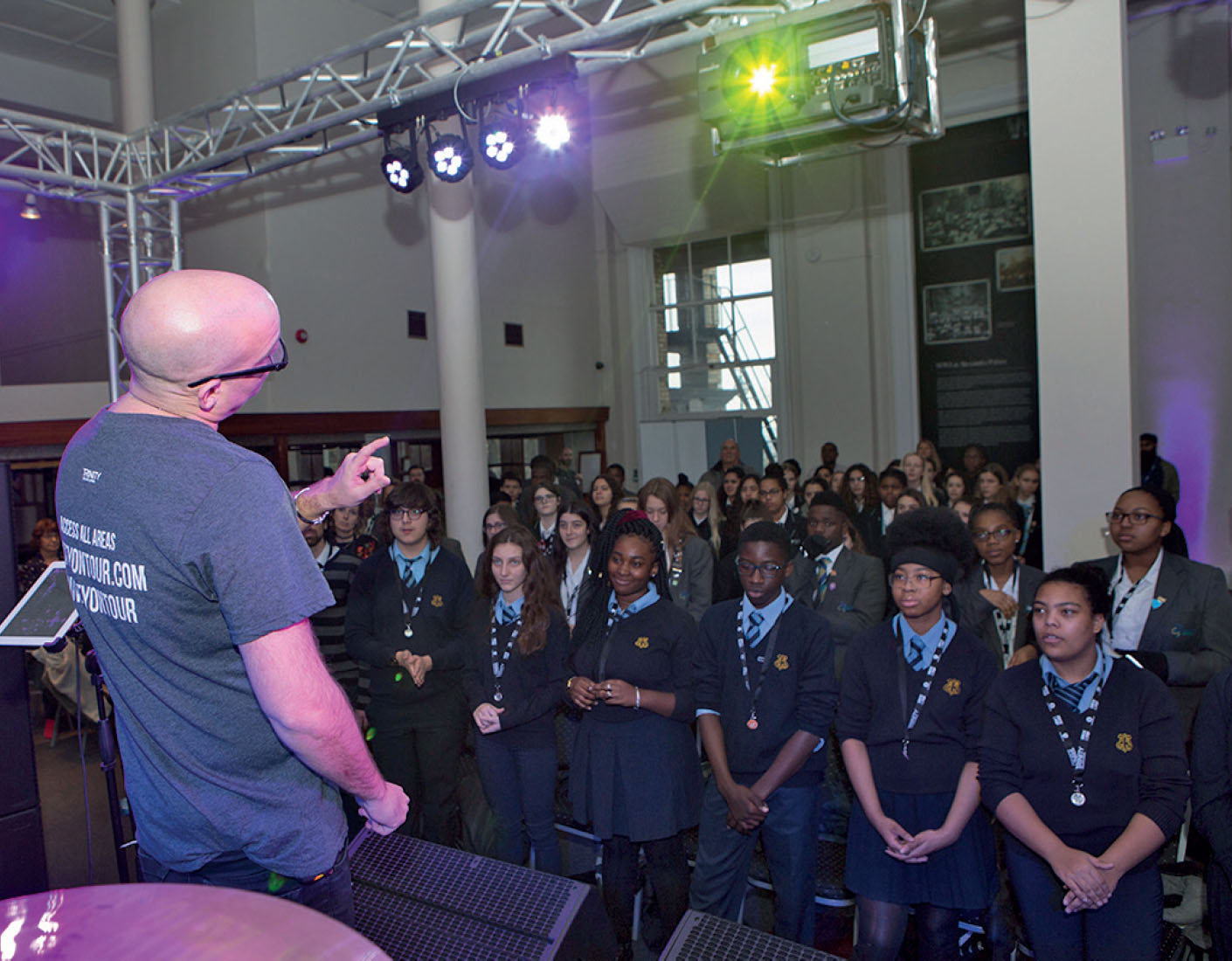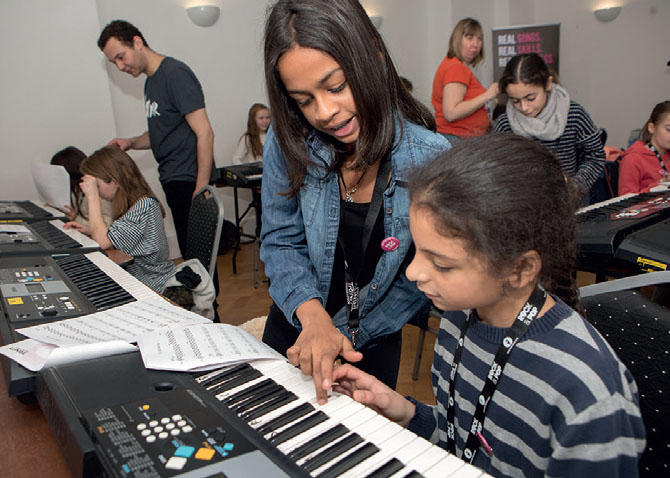
Toby Davies has to shout over the sound of so many young people in different rooms around us, plucking at guitar strings, drumming sticks against the backs of chairs, and exercising their vocal chords. ‘What is Trinity on Tour?’ I ask. ‘It's an event that is designed around giving children an introduction to music learning,’ he replies, ‘through visualisation and watching a live band perform, and then giving them the option to take part in a practical workshop that features a song they'll have just heard in the performance, with a technical element.’ Certainly, it sounds like the pupils are engaging.
Davies is the national advisor for Trinity Rock and Pop, which has just launched its new syllabus. Having found the previous syllabus an excellent means of learning and assessing, Trinity decided to focus on also bringing the performance element to schoolchildren – the result of which was last year's pilot of Trinity on Tour, a scheme that has since been rolled out across the country. Each event sees a band of musicians demonstrate the thrill of live performance to participating schools across the country, and then allows pupils to participate – all, of course, playing songs from Trinity's syllabus.

Pupils were split into age groups and by musical instrument
PRACTICAL EXPERIENCE
At the beginning of December I went to Alexandra Palace in London, where Trinity on Tour was taking place for one day (having also been in Barnsley and Newport). I witnessed first-hand the vitality that the performances brought to the young musicians in the room – and it was this performance element that pushed Davies to come up with the idea in the first place.
‘Before I worked at Trinity I was a musician and I used and loved the syllabus books. I went to the launch of the first syllabus in 2012, and there they had a live band playing various songs from the syllabus. You could then go off and flick through the books, and there were drum kits and keyboards set up, which we could play – so it was a practical experience. I was hearing songs that I listened to on the radio, and someone was telling me that I could play them in exams – it was brilliant.’
So in February 2016, Davies ran a pilot of Trinity on Tour in Cardiff, ‘after six months of planning and thinking about how we can change things – and we still are changing things, place to place, because each venue is different’.
Following the pilot, which was filmed, the video was sent across the country to music services and teachers. From there the scheme has been touring the country, working closely with music hubs to access pupils and encourage schools to participate.
For the Alexandra Palace event, Trinity worked in partnership with Haringey Music Service, ‘which has been fundamental in helping access the kids and getting them here – and actually they have also provided all the instruments,’ says Davies. ‘When you get a good music service like that, it's absolutely fantastic.’

Toby Davies addresses the pupils at Alexandra Palace
WORKING MUSICIANS
Trinity on Tour is connected to the 2018 Rock and Pop syllabus; it is about presenting music as a performative act, and using songs from the syllabus that the pupils will have heard themselves. Davies tells me that Trinity previously did lots of outreach and CPD with teachers, but nothing for those who were taking the exams, so Trinity on Tour is about bringing young people a musical experience and some exposure to the syllabus.
Musical exams can also be terrifying experiences for some, of course, but Davies is keen to stress that Trinity's examiners are a far cry from ‘old fuddy-duddies in tweet jackets – they're really lovely people, and working musicians themselves’. This, he hopes, communicates to the pupils in attendance that exams need not be frightening or inaccessible – they can be fun.
The aim of the syllabus is to mould working musicians, a role that requires a great deal of skill. How does the syllabus, and an event like Trinity on Tour, achieve something like that? In terms of the syllabus itself, according to Davies, it's down to the depth and breadth of the material – ‘sometimes the title “rock and pop” doesn't quite do it justice because there are so many other elements’ – which enables pupils to learn many different styles.
There's also the exam prep itself: ‘There's one part we call the Session Skills, which means that in the exam you have to choose either improvising or playback. Improvising is a massive skill you need as a musician. Even within the structure of playing with friends, improvisation is how songs are written. You don't start with a written piece of music – you start with the guitarist jamming something, and the bass player jamming something – that's how it comes along, so we wanted to include that creative avenue.
‘The playback element of the exam is basically sight-reading, which is another important avenue. Pupils can choose between improvisation or playback, but it's important that they practise both, because in the long-term, in order to become a successful musician, they're two skills that they'll really need.’
ACCOMPANYING RESOURCES
The syllabus itself has been updated with more modern songs, says Davies, but something he's very excited to tell me about is the accompanying resources – both for pupils and teachers. For pupils, Davies says, ‘we have just launched the Trinity Practice App, which is something we didn't have before, and it's proving really popular.
‘One thing we needed was to create a tool that enabled a self-taught learner, for somebody who has a lesson at school, and then doesn't have another lesson until the following week – like some of the lower-level learners. So it was about what things we could introduce in the app that would help that learner – things like tempo changes, transposition tools for vocalists, and the way the lyrics slide across the screen.’
For teachers, there is a series of accompanying resources, including a collection of books with sheet music specific to each instrument, as well as downloadable backing tracks and demo tracks. They are, according to music teacher Ty Lowe from Gladesmore.

The workshops were practical, with a technical element
Community School, ‘usually very true to the original tracks’, which is both handy for teachers who may not know much about modern rock and pop, and also bridges the connection for pupils who might feel they know everything about it.
‘Obviously we have kids who are interested in loads of different genres, from rock and pop, to R&B and beyond. The resources introduce so much choice and differentiation in terms of lower ability to higher ability,’ says Lowe. ‘They're so accessible. Some of my peripatetic teachers had never used them before, so this year we've introduced them across drums, guitar and bass – they've gone down very well, and the teachers have started using them in their different schools.’
What is it about the resources that makes them so accessible? ‘Just that they're very user-friendly: they're clear, the scores are easily readable, there's no crazy jargon. Also, they give the kids scope to improvise and make it their own. They have technical focuses and different things that they can do with them.’
Trinity on Tour is still very young, but from what I saw at Alexandra Palace has already been extremely well received by both pupils and teachers. But what's in store for the future? ‘We're planning now for the next academic year,’ says Davies. ‘Up until June, we're in Ireland, Norwich, Brighton and Scotland.’ And the long-term goals are ‘to keep going’ to capitalise on a ‘snowball effect’ of interest in the scheme's first two years.
‘Everybody has a different musical journey that they want to embark on, and all we do is provide the books and knowhow to help them on that journey.’








